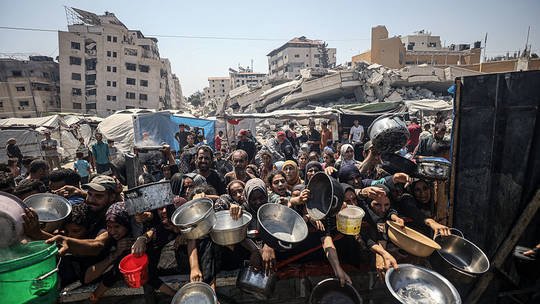More than 1,000 rabbis and Jewish scholars from around the world have joined together to condemn what they describe as the use of hunger as a weapon in the ongoing Gaza conflict, calling on the Israeli government to urgently allow life-saving humanitarian aid into the besieged Palestinian territory.
The signatories—hailing from the United States, United Kingdom, European Union, and Israel—warned in an open letter that the Jewish people “face a grave moral crisis” and that withholding aid violates fundamental ethical and religious principles rooted in Judaism.
This comes as the head of the United Nations Relief and Works Agency for Palestine Refugees (UNRWA), Philippe Lazzarini, reported that nearly 90,000 women and children are currently suffering from acute malnutrition in Gaza. He called the unfolding disaster a man-made famine driven by months of blockade and restricted humanitarian access.
“What we’re witnessing is not a natural catastrophe—it’s a deliberate denial of aid,” said Lazzarini. “We are past warnings. We are in the midst of a famine.”
To understand more about famine in conflict zones, see Starvation as a method of warfare.
A Crisis of Conscience and Humanity
Gaza has endured more than nine months of relentless military operations and tight restrictions on essential goods. Despite repeated calls from the International Committee of the Red Cross (ICRC) and other aid organizations, access to food, water, and medical supplies remains extremely limited.
Also Read; TRA Sets Deadline for Online Sellers to Register
Aid workers on the ground say even hospitals are running out of basic supplies, and some of their own staff have collapsed from hunger. Entire families are reportedly surviving on animal feed and unclean water. The World Food Programme (WFP) has classified much of northern Gaza as being in Phase 5 (Catastrophic) food insecurity.
To read more about how famine classification works, visit the IPC Famine Scale.
Jewish Ethical Voices Take a Stand
The open letter, signed by rabbis from Reform, Conservative, and Orthodox branches of Judaism, underscores the centrality of pikuach nefesh—the Jewish legal concept that preserving human life overrides almost all other religious obligations.
“If we remain silent as innocents starve, we betray the very soul of our tradition,” the letter states. “This is not about politics. It is about preserving our humanity.”
Many of the signatories said they were moved to act by historic Jewish experiences of persecution and hunger, particularly during events like the Holocaust, where food deprivation was used as a genocidal tool.
Their appeal also comes amid growing calls from secular organizations and international figures for an immediate ceasefire and a comprehensive humanitarian access plan.
Human rights groups, including Human Rights Watch and Amnesty International, have echoed similar concerns, accusing Israeli authorities of violating international law by obstructing aid and collectively punishing the civilian population.
Despite occasional airdrops and temporary ceasefire corridors, humanitarian organizations argue that a consistent and large-scale reopening of border crossings like Rafah and Kerem Shalom is the only viable solution to avert a worsening humanitarian disaster.







